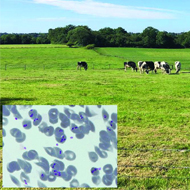
The grants will support research into bovine babesiosis and bovine tuberculosis vaccines.
Two international 'pump-prime' grants amounting to almost £168,000 have been awarded to the Royal Veterinary College (RVC) to advance research into cattle vaccines.
The funding from the International Veterinary Vaccinology Network (IVVN) will support studies into bovine babesiosis and bovine tuberculosis vaccines to enhance cattle welfare.
The first grant, amounting to £89,000, will support the investigation of the genetic diversity and vaccine potential of thrombospondin-repeat domain (TSR) proteins against bovine babesiosis.
The second grant, totalling nearly £79k, will use Nanopore DNA sequencing to improve understanding of genetic diversity in bovine tuberculosis (bTB) strains circulating in Algeria.
Vaccinology lecturer Dr Ellen Knuepfer will lead the research into TSR alongside Dr Silvina Wilkowsky, an independent researcher based at the Institute of Agricultural Biotechnology and Molecular Biology, Argentina.
She said: “This funding will allow us to test a group of proteins called TSR proteins not only on a genetic level, but also explore their function, and application as vaccine antigen to protect cattle from this often fatal disease.”
Dr Sharon Kendall, associate professor in molecular bacteriology and Dr Dong Xia, senior lecturer in bioinformatics at the RVC will be leading the research into bovine tuberculosis.
They will work alongside Dr Rachel Tanner, associate professor of One Health at the University of Oxford and Dr Mammar Khames, researcher and lecturer at the University of Medea, Algeria.
Dr Tanner said: “This is an excellent opportunity to further strengthen links between Oxford and RVC, as well as form a new partnership with researchers at Medea University. The project brings together a broad range of expertise to create a team that is greater than the sum of its parts, tackling the important global One Health issue of bovine TB.”
Dr Khames added: “As a veterinarian and zoonotic disease researcher in Medea University, Algeria, I'm delighted to be working with collaborators from the RVC and Oxford University on this project, which will enable me to acquire skills in the field of bovine tuberculosis research. Let's hope this will lead to promising results and a wider project in the future.”
Image (C) RVC.



 The latest
The latest